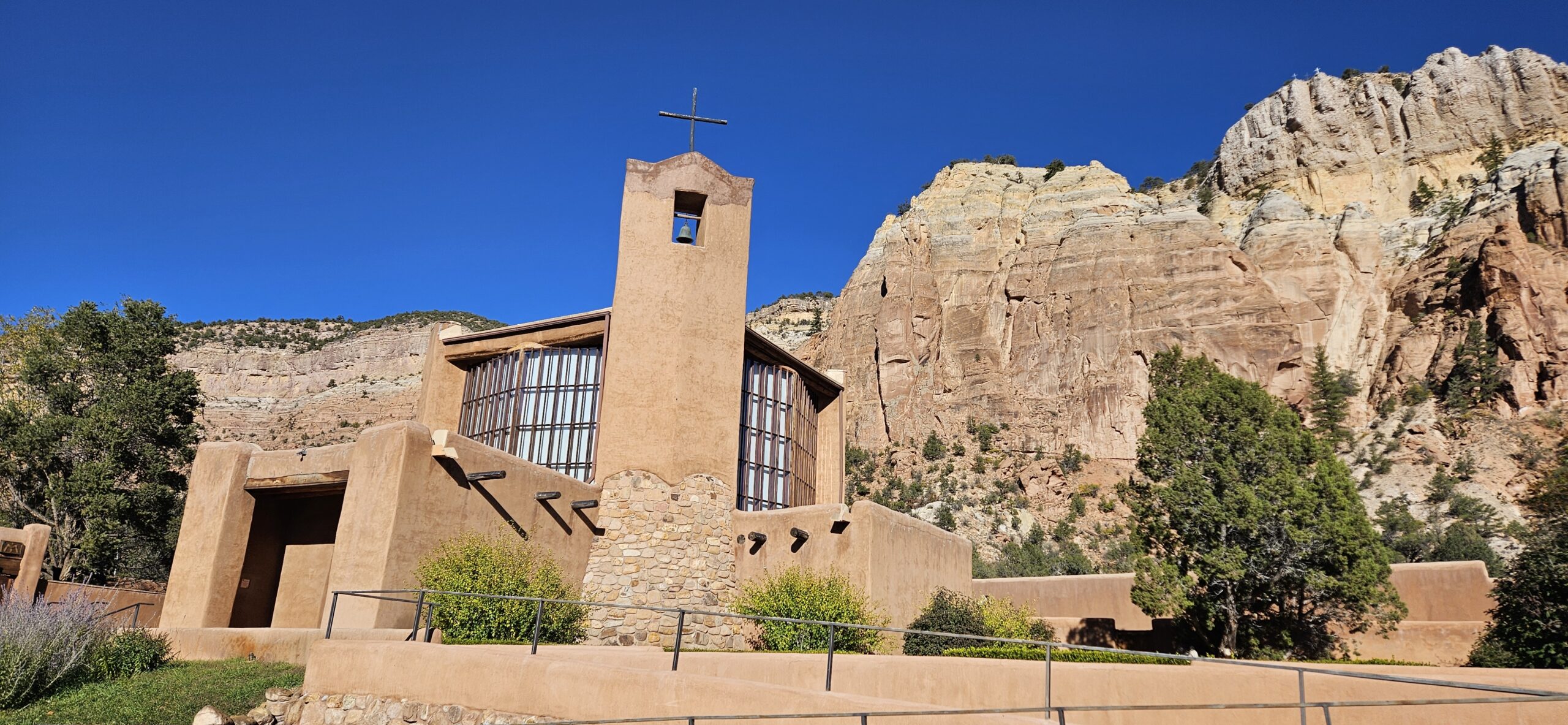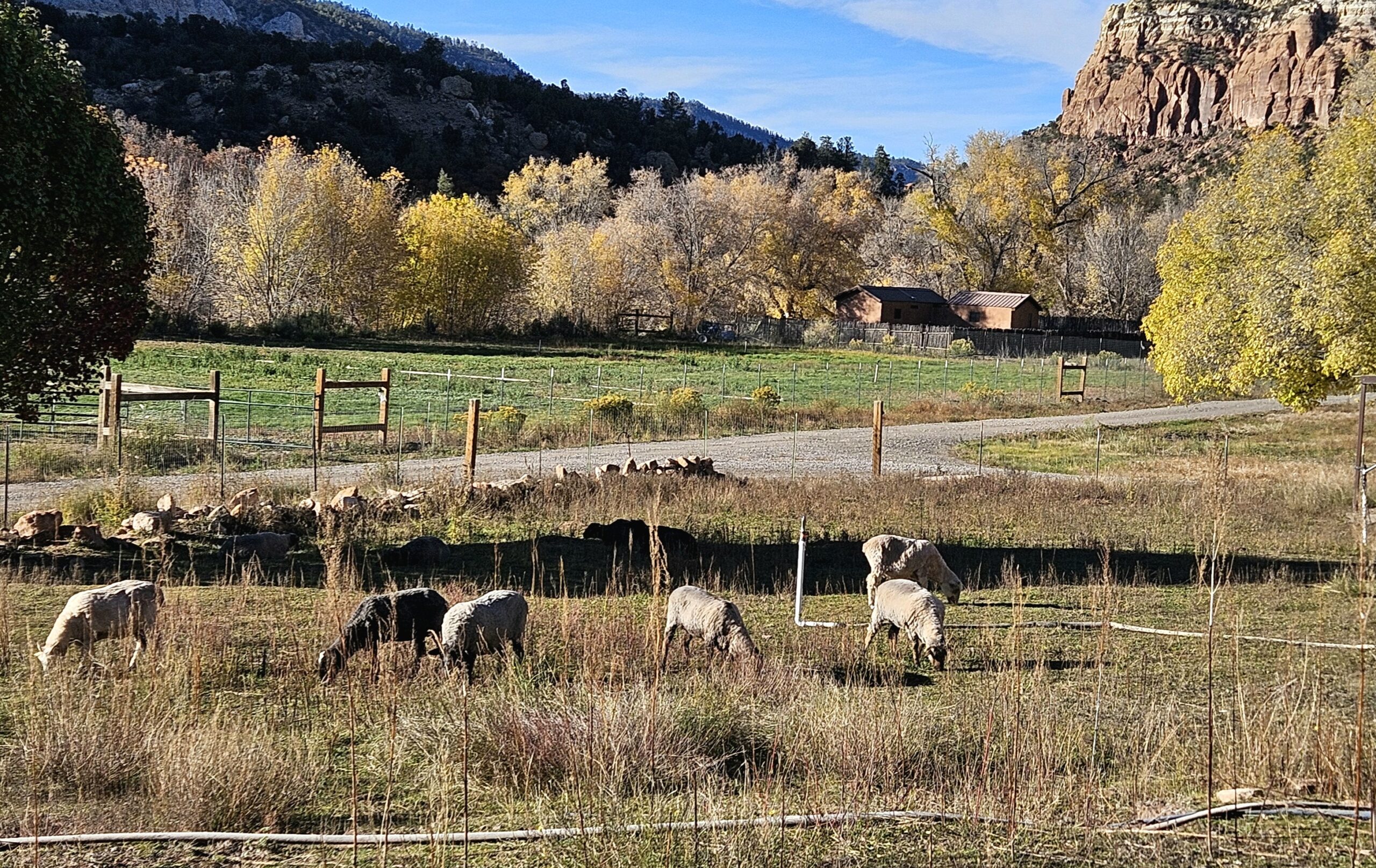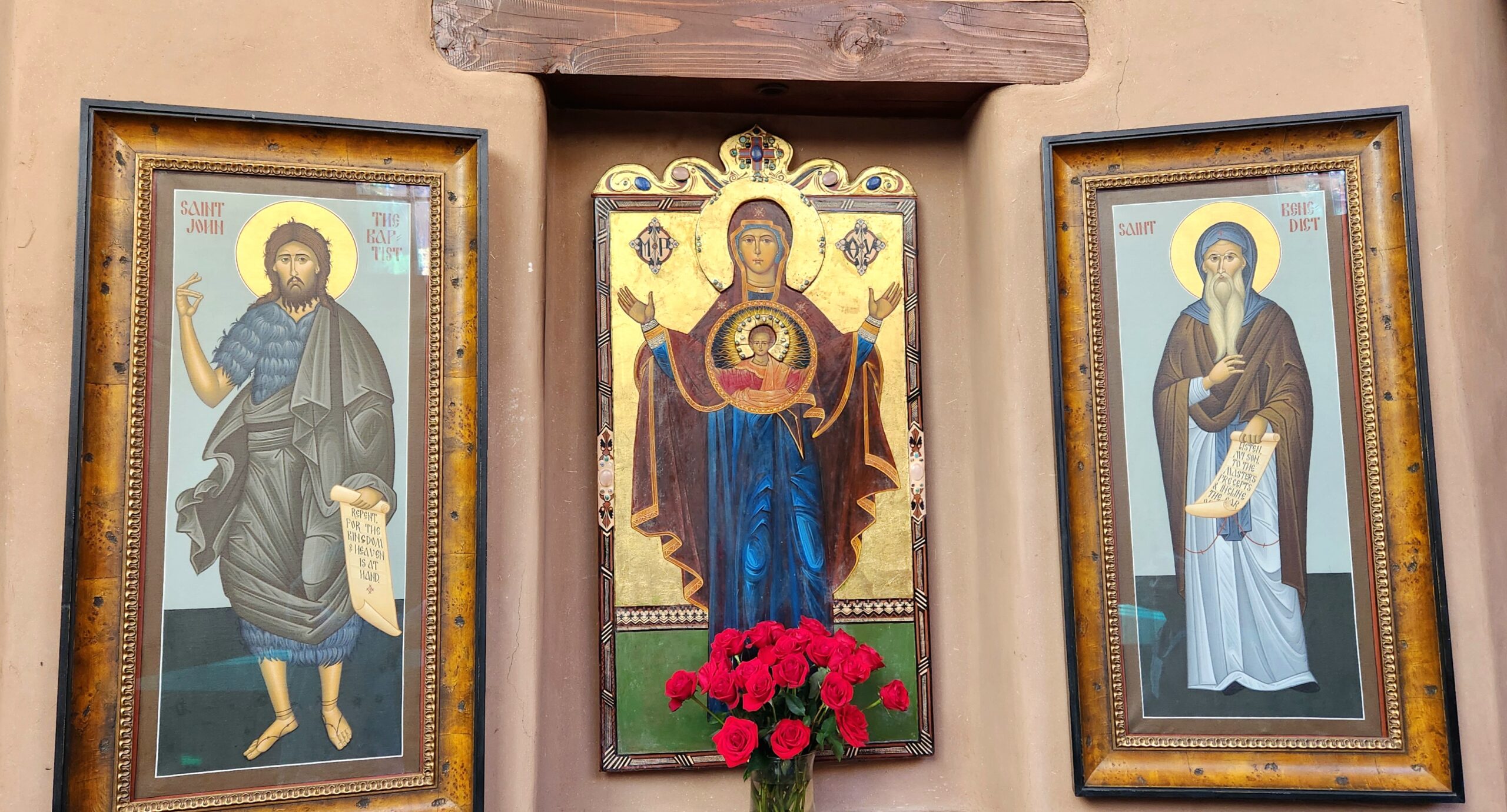[This post was written on Sunday, October 26, 2025]
Today, we had the blessing of celebrating Mass with the Benedictine monks at the Monastery of Christ in the Desert. Their chapel is small but beautiful – a mix of adobe, wood, and glass windows that start some 15 feet above the tabernacle and soar another 15 feet up, showcasing the red canyon walls just outside the chapel. Their impressive acreage borders the Chamma River in northern New Mexico, and, 13 miles down the dirt road you must take to reach the monastery, it opens up into what I call a mini Zion National Park. The natural beauty here steals your breath – especially since we’re here the last week in October and the brilliant yellow leaves of the hardwoods contrast with the dark green pine and juniper as well as the sage green of sagebrush and chama cactus. The monks tend a large flock of chickens, a modest herd of sheep, hundreds of honeybees, and a friendly working donkey. They also grow vegetables and carry out a number of other labors. They only have 15 brothers here, which is a shame, because both the working life and the prayer life in this treasure of a monastery are thriving.
It’s a special place to have a retreat, and on this, our third visit in 7 years, we see many visitors like us who eagerly take some days to stay in their modest guest housing and pray alongside the brothers. So – for anyone who’s reading – cancel your plans to visit Disneyland or Europe or whatever destination you have in your sights and take some time for God in one of the most dear-to-our-hearts places.
Today, my heart truly soared while participating in the liturgy with the monks. For my sensibilities, this was as close to perfect of a celebration of the Roman Rite that I could hope for. The entire Mass was chanted and sung, except for the homily (and what a great homily!). Brother David is an accomplished cantor and led us all through the proper antiphons for entrance, offertory and communion. We chanted the beautiful Missa Orbis Factor throughout, and Brother David even treated us to some contemplative organ music post-communion and after Mass. The monks, most of whom today were also con-celebrating priests, vested for Mass and participating from the choir stalls, all exuded a touching reverance for the rite from beginning to end. Incense was used before the gospel reading and again during the consecration. My soul was full!

The main celebrant was Fr. Zachary, the prior. Trained in the Neocatechetical Way and having served as a missionary priest in Japan for decades, he was a fantastic preacher. Neither full of rhetorical fireworks nor staid and musty, he was simply measured, articulate, and focused. He tied in the first reading to the gospel, as well as quotes from such sources as the founder of the Hassidic Jewish sect and St. Irenaeus. It was his take on the gospel, however, and his gentle suggestion that we allow Jesus’ words to touch us more deeply, that made me want to write this blog.
Fr. Zachary simply asked if we tell ourselves we are more like the publican who approaches the Lord in humility or if we see ourselves as the pharisee who feels that he is doing everything right and is following the Lord’s precepts as carefully as possible. While we all want to be like the publican, he suggested that perhaps we’re more like the pharisee than we’d like to admit. Jesus, he said, is talking about the nature of our hearts – do we secretly judge ourselves against others? Do we secretly feel superior to those who fail in little (and big) ways? Do we feel like we’ve kind-of got this under control, and if we keep making adjustments as we go, we can get to that goal of heaven?
This really struck me. Especially when he said that Jesus wants us to acknowledge that we need God. That we are fundamentally broken without him and will always fall back into a state of sin. It’s not the accounting of sins and the correcting them that’s at stake, Fr. Zachary said. It’s the more fundamental question of admitting our need that will never go away, confessing that to God and coming to him humbly in prayer and love. Christianity is not about small improvements and little personal perfections we make to get to our goal, he said. It’s not about logging hours caring for the poor and needy – even though those things are good and important. It’s about turning to Christ and acknowledging the brokenness within us and asking him – and only the Man God who died on the Cross – to help us, because that’s exactly the gift God gave us in Christ.
So, when we go to Mass or pray at other times in our day, is that our fundamental posture towards ourselves and towards God? What an excellent question!

As I thought about his homily, a number of things came to mind. First, if this is taken too far, we might be tempted to say that God wants us to be broken. This is clearly not the case because he has been working throughout history to lead us back to him, culminating with the sacrificial offering of his Son as a way to redeem humanity. But there is something here. Perhaps he wants us to acknowledge our fundamental brokenness and need for him to perfect us because he knows that that is the only way humanity can be perfected. This is the role of the Father. An analogy might be trying to have toddlers acknowledge that they can’t weild sharp knives in the kitchen even if they want to make us a fantastic meal and care for their family. It’s simply not possible for toddlers to handle a large chef’s knife, much less with the precision and effort it takes to prepare a meal. Plus, it’s dangerous. In like fashion, we are not capable of living a good life without the help of our Father. We don’t have the wisdom, fortitude, or sinlessness to do it. Concupiscence – the inborn tendency to sin that all humans since Adam have as a stain on their soul – acts like the tiny hands and attention span of the toddler who wants to cook like daddy.
But the Father can help the child. The Father has given us a Way, but that way begins with a heart that’s conformed to him. Not just a heart that likes Mass and chanting, not just a heart that likes the feeling of community or the spiritual consolation of the Eucharist. What does it mean to have a heart conformed to God? Today, I learned that it means the full admission that I need God fundamentally – in everything I do or think, and from now until I die.
Wow, that sounds really … weak. Really broken. Not something that attracts people to you or to the faith.
But I think this is just fear talking (and pride). The thing I might be forgetting is that God responds and provides supernatural strength and help. And the more we surrender to him, the more his response and guidance are the things that show in us. The most humble saint doesn’t appear weak! Even if physically withered, the holy person has a glow in their eyes, a gentleness in their movements, a welcome in their refusal to judge. It has a name: divine love, flowing through them.
Related to this, the part of the sermon about Christianity not being about incremental self-improvement really hit home with me. So much in my life has been about showing proficiency: in school, in sports, as a parent, as a homeowner, etc. The development of knowledge and skills has a premium in my family and in my (former) academic and professional lives. This isn’t necessarily bad, it just shouldn’t be number one. In fact, it can be spiritually harmful when it leads to a difficulty admitting fault or failure or a constantly critical nature, seeking for betterment (of ideas, of methods, of being). This is spiritually harmful because it pulls us into the thinking of the pharisee from today’s gospel reading. We begin to not only judge ourselves but others. We begin to think that – with enough knowledge and proficiency – we’ve got it pretty much under control. Worse yet, we might operate as if we don’t need God. In our quest to be impressive, or solve homelessness, or cure world hunger, we might lose sight of the fact that the real goal is unity with our Creator and that requires a constant vulnerability in coming to him for help and guidance.
Speaking of which, we are bombarded with products and programs aimed to help us improve ourselves. It’s created a pervasive feeling that while we’re not quite where we should be, we can get there with the right product or the right 12-step program. This type of thinking is exactly the type of stance that keeps us from truly conforming our hearts to God in full honesty and humility. Don’t get me wrong, I think it’s great for people to become smarter, more empathetic and other personality traits aligned with living the virtuous life. I just think we can’t let this type of thinking form our outlook. Because even with the best education out there, someone else might have a more truthful insight. Even with the best anger management program under your belt, human nature is what it will always be. In these times, God is the one who can make us whole, help us cope, and allow us a small share in his divinity to overcome those moments.
So, I ask myself, do I have the humility to admit that I can’t do this? To admit that I will never have it under control? Because the “it” we’re talking about is not fixing a broken pipe or giving a great lecture (although those are in the mix, too). The “it” we’re talking about is holiness, salvation, living in a way that will bring me to God for eternity. An even harder thing to admit as a Lay Dominican is that I’m fooling myself when I think that my hours of prayer and attention to the virtuous life are “gaining” me closeness to God and his Kingdom. The lesson here is that nothing we do can justify us (to use Christ’s words) except coming to God and admitting that we need him to guide us because we are sinners by nature and will be for the rest of our lives. We can’t fix ontology.
Last, I don’t want anyone who has read this far to think that I’m being gloomy. Quite the opposite! I actually feel like a huge weight is lifted – that I no longer have to worry about being the best at everything, all on my own. An acceptance of our lifelong need for God’s mercy is a fantastic spiritual insight that God has been giving us throughout the scriptures and poignantly in the life of Jesus Christ. “Not my will, but yours be done,” said our Savior, the only one in history whose human nature, will and energies were completely in accord with the divine nature, will and energies. Let’s listen to him.